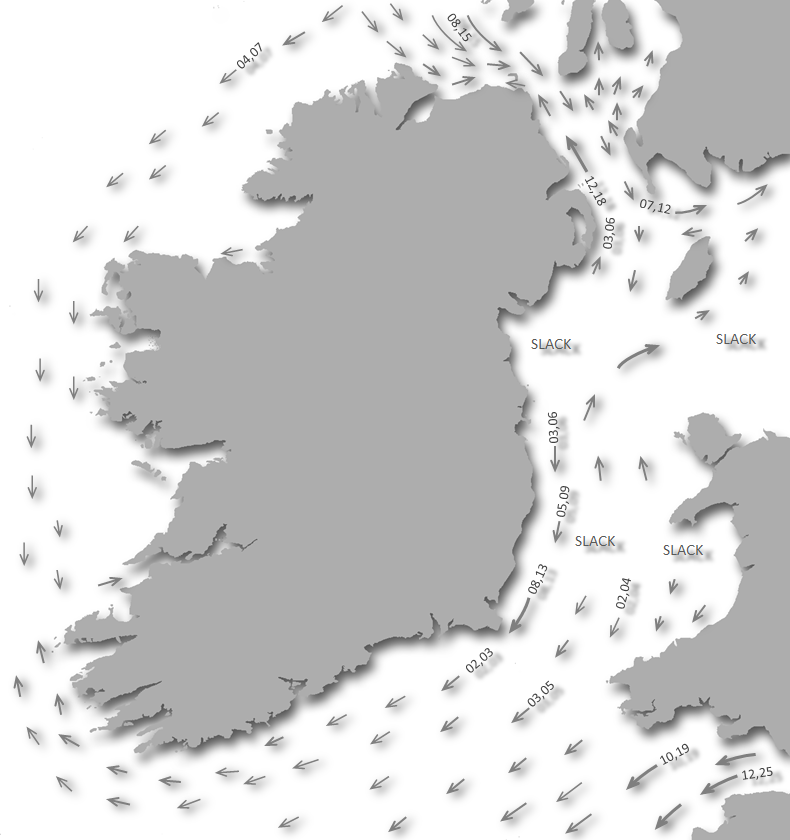.jpg)
Pincher Bay is a small bay located immediately south of Fanad Head on the western shore of the entrance to Lough Swilly. It is a spacious and quickly accessible bay that offers an anchorage in a scenic and rural setting.
The bay provides a fair weather anchorage with tolerable shelter in settled or moderate prevailing conditions. Being unencumbered by outlying hazards and lying immediately south of Fanad Head lighthouse, it has straightforward access night and day, at all stages of the tide and in all reasonable conditions.

Keyfacts for Pincher Bay
Last modified
July 10th 2021 Summary
A tolerable location with straightforward access.Facilities


Nature






Considerations

Position and approaches
Expand to new tab or fullscreen
Haven position
 55° 16.333' N, 007° 38.010' W
55° 16.333' N, 007° 38.010' WThis is just inside the 5-metre contour in Pincher Bay.
What is the initial fix?
The following Lough Swilly Initial Fix will set up a final approach:
 55° 17.800' N, 007° 35.030' W
55° 17.800' N, 007° 35.030' W What are the key points of the approach?
Offshore details are available in northwestern Ireland’s coastal overview for Erris Head to Malin Head  . A set of waypoints to assist when running up lough, as far as Fanad, can be found in the Lough Swilly Route
. A set of waypoints to assist when running up lough, as far as Fanad, can be found in the Lough Swilly Route .
.
 . A set of waypoints to assist when running up lough, as far as Fanad, can be found in the Lough Swilly Route
. A set of waypoints to assist when running up lough, as far as Fanad, can be found in the Lough Swilly Route .
.Not what you need?
Click the 'Next' and 'Previous' buttons to progress through neighbouring havens in a coastal 'clockwise' or 'anti-clockwise' sequence. Below are the ten nearest havens to Pincher Bay for your convenience.
Ten nearest havens by straight line charted distance and bearing:
- Portsalon - 4 nautical miles S
- Lenan Bay - 4.2 nautical miles ESE
- Crummie's Bay - 5 nautical miles SE
- Dunree Bay - 5.7 nautical miles SSE
- Scraggy Bay - 6.4 nautical miles SSE
- Mulroy Bay - 7.4 nautical miles SW
- Sheep Haven - 8.7 nautical miles SW
- Macamish Bay - 8.9 nautical miles SSE
- Buncrana - 10.5 nautical miles SE
- Rathmullan - 11.2 nautical miles SSE
These havens are ordered by straight line charted distance and bearing, and can be reordered by compass direction or coastal sequence:
- Portsalon - 4 miles S
- Lenan Bay - 4.2 miles ESE
- Crummie's Bay - 5 miles SE
- Dunree Bay - 5.7 miles SSE
- Scraggy Bay - 6.4 miles SSE
- Mulroy Bay - 7.4 miles SW
- Sheep Haven - 8.7 miles SW
- Macamish Bay - 8.9 miles SSE
- Buncrana - 10.5 miles SE
- Rathmullan - 11.2 miles SSE
What's the story here?
 Pincer Bay
Pincer BayImage: Kevin Flanagan
Pincher Bay lies immediately south of Fanad Head and is entered between it and Carrickacken Point a distance of just under a ½ mile southward. The bay and entrance to Lough Swilly is well defined by Fanad lighthouse on the point, Fl (5) WR 205 38m 18/14M.
How to get in?
 Use northwestern Ireland’s coastal overview for Erris Head to Malin Head
Use northwestern Ireland’s coastal overview for Erris Head to Malin Head  for approaches. A set of waypoints to assist when running up lough, as far as Fanad, can be found in the Lough Swilly Route
for approaches. A set of waypoints to assist when running up lough, as far as Fanad, can be found in the Lough Swilly Route .
.  For Pincher Bay it is best to approach the lough from a central point, as a spit with less than 8 metres of water extends nearly half a mile northeastward from the lighthouse. In heavy gales, the sea breaks on this and on the adjacent uneven ground. Even after the gale has subsided the rollers are dangerous, rendering it prudent to give the point a wide berth in passing.
For Pincher Bay it is best to approach the lough from a central point, as a spit with less than 8 metres of water extends nearly half a mile northeastward from the lighthouse. In heavy gales, the sea breaks on this and on the adjacent uneven ground. Even after the gale has subsided the rollers are dangerous, rendering it prudent to give the point a wide berth in passing. The best anchorage is to be had in the middle of the bay in 3 metres or as far in as draft permits making the best of the shelter that its rugged cliffs provide to the prevailing winds. Holding is excellent in clear sand.
The best anchorage is to be had in the middle of the bay in 3 metres or as far in as draft permits making the best of the shelter that its rugged cliffs provide to the prevailing winds. Holding is excellent in clear sand.Why visit here?
Pincher Bay is situated at the very north of the Fanad Peninsula, which lies between Lough Swilly and Mulroy Bay. Although the origins of the name Fanad have been lost in time, there is some speculation that the name derives from an old Gaelic word fana meaning sloping ground. Fanad lighthouse at sunrise
Fanad lighthouse at sunriseImage: Tourism Ireland
The most prominent feature of Pincher Bay is Fanad lighthouse situated on the cliffs at Fanad Head. The lighthouse was erected and first lit in 1817 in response to the sinking of the frigate HMS Saldana in December 1811. Overwhelmed by a winter storm the frigate ran for natural shelter the Lough offered, but fell short of the entrance to break up under Fanad Head. The only survivor of the tragedy was the ship’s parrot which was identifiable because it bore a silver collar inscribed with the ship’s name.
 Pincer Bay Beach
Pincer Bay BeachImage: © Ronan Daly
The response to the tragic loss of life was a lighthouse to help guide ships and sailors safely into the most protected haven the north coast has to offer. The height of the lighthouse was increased in the 1880s and its light enhanced in 1906. Its light was completely replaced with modern electric equipment in 1975 and automated in 1983. It is classified as a sea light, not a harbour light, despite it marking the entrance into Lough Swilly which is a natural harbour of refuge. Today it acts as the land base for helicopters to make crew changes for the lighthouse stations on Tory Island and Inishtrahull.
 The landing steps beneath Fanad lighthouse with Pincher Bay in the backdrop
The landing steps beneath Fanad lighthouse with Pincher Bay in the backdropImage: Kevin Flanagan
From a sailing point of view it is Pincher Bay's spectacular rugged cliffs and the enclosed secluded beach, on which it is possible to land a dinghy to go exploring, that makes it a wonderfully rewarding location. Fanad lighthouse is also a must visit here, and it may be accessed via its jetty. Standing between idyllic Lough Swilly and sandy Mulroy Bay, Fanad Head Lighthouse is one of Ireland's most photographed lighthouses and has been voted one of the most beautiful lighthouses in the world. It has been developed into a visitors’ centre with accommodation so it is well worth visiting.
What facilities are available?
There are no facilities in Pincher Bay.With thanks to:
Photography with thanks to Kieren Evans, Greg Clarke, Corinne Schleifer, Kenneth Allen and Michael Murtagh.


A brief view of Pincher Bay.
About Pincher Bay
Pincher Bay is situated at the very north of the Fanad Peninsula, which lies between Lough Swilly and Mulroy Bay. Although the origins of the name Fanad have been lost in time, there is some speculation that the name derives from an old Gaelic word fana meaning sloping ground.
 Fanad lighthouse at sunrise
Fanad lighthouse at sunriseImage: Tourism Ireland
The most prominent feature of Pincher Bay is Fanad lighthouse situated on the cliffs at Fanad Head. The lighthouse was erected and first lit in 1817 in response to the sinking of the frigate HMS Saldana in December 1811. Overwhelmed by a winter storm the frigate ran for natural shelter the Lough offered, but fell short of the entrance to break up under Fanad Head. The only survivor of the tragedy was the ship’s parrot which was identifiable because it bore a silver collar inscribed with the ship’s name.
 Pincer Bay Beach
Pincer Bay BeachImage: © Ronan Daly
The response to the tragic loss of life was a lighthouse to help guide ships and sailors safely into the most protected haven the north coast has to offer. The height of the lighthouse was increased in the 1880s and its light enhanced in 1906. Its light was completely replaced with modern electric equipment in 1975 and automated in 1983. It is classified as a sea light, not a harbour light, despite it marking the entrance into Lough Swilly which is a natural harbour of refuge. Today it acts as the land base for helicopters to make crew changes for the lighthouse stations on Tory Island and Inishtrahull.
 The landing steps beneath Fanad lighthouse with Pincher Bay in the backdrop
The landing steps beneath Fanad lighthouse with Pincher Bay in the backdropImage: Kevin Flanagan
From a sailing point of view it is Pincher Bay's spectacular rugged cliffs and the enclosed secluded beach, on which it is possible to land a dinghy to go exploring, that makes it a wonderfully rewarding location. Fanad lighthouse is also a must visit here, and it may be accessed via its jetty. Standing between idyllic Lough Swilly and sandy Mulroy Bay, Fanad Head Lighthouse is one of Ireland's most photographed lighthouses and has been voted one of the most beautiful lighthouses in the world. It has been developed into a visitors’ centre with accommodation so it is well worth visiting.
Other options in this area
Click the 'Next' and 'Previous' buttons to progress through neighbouring havens in a coastal 'clockwise' or 'anti-clockwise' sequence. Alternatively here are the ten nearest havens available in picture view:
Coastal clockwise:
Portsalon - 2.5 miles SScraggy Bay - 4 miles SSE
Macamish Bay - 5.5 miles SSE
Rathmullan - 7 miles SSE
Ramelton - 8.7 miles S
Coastal anti-clockwise:
Mulroy Bay - 4.6 miles SWSheep Haven - 5.4 miles SW
Tramore Bay - 9.1 miles WSW
Tory Island - 12.6 miles W
Toberglassan Bay - 12 miles WSW
Navigational pictures
These additional images feature in the 'How to get in' section of our detailed view for Pincher Bay.




| Detail view | Off |
| Picture view | On |
A brief view of Pincher Bay.
Add your review or comment:
Please log in to leave a review of this haven.
Please note eOceanic makes no guarantee of the validity of this information, we have not visited this haven and do not have first-hand experience to qualify the data. Although the contributors are vetted by peer review as practised authorities, they are in no way, whatsoever, responsible for the accuracy of their contributions. It is essential that you thoroughly check the accuracy and suitability for your vessel of any waypoints offered in any context plus the precision of your GPS. Any data provided on this page is entirely used at your own risk and you must read our legal page if you view data on this site. Free to use sea charts courtesy of Navionics.














